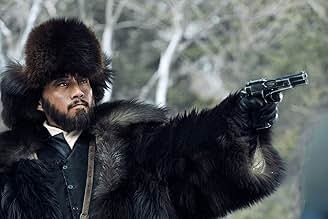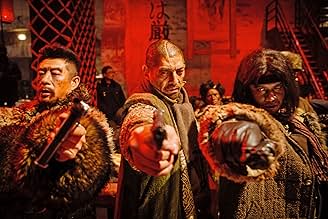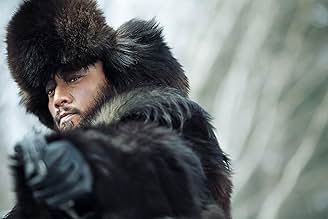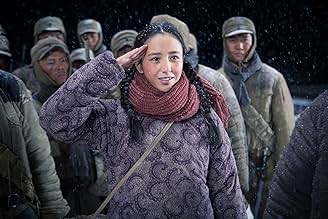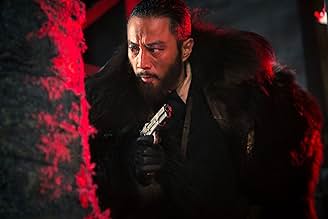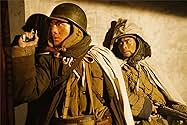CALIFICACIÓN DE IMDb
6.4/10
3.5 k
TU CALIFICACIÓN
Una historia centrada en un conflicto entre un escuadrón del Ejército de Liberación Popular y una banda de bandidos en el noreste de China durante la revolución china.Una historia centrada en un conflicto entre un escuadrón del Ejército de Liberación Popular y una banda de bandidos en el noreste de China durante la revolución china.Una historia centrada en un conflicto entre un escuadrón del Ejército de Liberación Popular y una banda de bandidos en el noreste de China durante la revolución china.
- Premios
- 21 premios ganados y 41 nominaciones en total
Opiniones destacadas
Very interesting action adventure with some impressive camera work. The action sequences are amazing and the film is totally unpredictable. The tiger scene was incredible! I loved the film, effects, story and music. Very well done.
Like John Woo's 'The Crossing', Tsui Hark's 'The Taking of Tiger Mountain' is set during the Civil War in the late 1940s; but instead of depicting the struggle between the People's Liberation Army and the Nationalists, Tsui and his four other screenwriters pit a certain Unit 203 of the PLA against a band of ruthless bandits whose stronghold is located high up in the snowy Tiger Mountain. Key to the PLA's strategy was a certain Yang Zirong, who infiltrated the bandits' stronghold and provided vital information which enabled his unit to triumph guerrilla-style against their more numerous and more well-equipped enemies.
No matter that he has been made to look like Hugh Jackman's Wolverine, Zhang Hanyu commands every single moment he is on screen as Zirong with a compelling performance of nuance and gravitas. While Lin Gengxin plays the righteous leader of Unit 203 Shao Jianbo with conviction and Tony Leung Kar-Fai is suitably hammy as the bandits' leader Lord Hawk, it is Zhang who truly owns the entire film, and it is no coincidence that his character is the most fully formed one of a movie which sometimes struggles to find the right balance of tone between fiction and history.
That is perhaps inevitable given the slightly uneasy fit between material and filmmaker. Much as Tsui Hark is no stranger to epics, he isn't exactly the sort of filmmaker who tells a straightforward historical tale – even his arguably most popular 'Once Upon A Time in China' trilogy about the legendary folk hero Wong Fei Hung was embellished with his penchant for the theatrical. And so it is with his latest, which depicts the heroism of the 203 Unit with the sort of self-serious posture which historical accounts typically adopt but the loutishness of the bandits with the sort of eccentricity that made his fantasy epics such as 'The Legend of Zu' and the more recent 'Detective Dee' enjoyable flights of fancy.
Amidst the tonal shifts, Zhang more than holds his own as Tsui's protagonist, an enigmatic stranger who joins the 203 with the medical officer Bai Ru (Tong Liya) and is at first met with doubt and scepticism by Jianbo. It is Zirong who comes up with the plan for him to go undercover by bringing to Lord Hawk a much coveted map with the locations of treasure left by the fleeing Japanese at the end of the Sino-Japanese war, and also to his quick-witted credit that he manages to win the trust of Lord Hawk to be sworn in as one of the league of brothers.
It is a shaky one though – not only is he tested from within by his Second Brother (Yu Xing) who stages a mock invasion by the PLA and Lord Hawk's woman Qinglian (Yu Nan) who is under orders to try to seduce him, Zirong's identity is also threatened when a spy planted by the bandits within the villagers escapes after a failed attack by the former on the PLA soldiers protecting the latter. Such moments of genuine tension are perfectly positioned to keep the narrative taut, which largely unfolds as a buildup to the storming of the bandits' fortress on the eve of New Year's Eve on the occasion of Lord Hawk's birthday.
Quite unlike the typical Tsui Hark movie therefore, this one has clearly fewer setpieces; indeed, we count just three – the first encounter between the PLA 203 Unit and the bandits at an abandoned warehouse; the failed attack led by Fifth and Sixth Brother on the village protected by the same unit; and finally the incursion of Lord Hawk's bastion to annihilate his reign of tyranny once and for all. Nonetheless, apart from some gimmicky slo-mo shots meant to justify the price of 3D for those who paid to see it with the additional dimension, these setpieces unfold with the scale and spectacle that one would expect from Tsui, the latter two in particular pop with thrill and imagination using a combination of old-school stunt staging and some nifty modern day CG effects.
Not quite so successful is Tsui's attempt to capture the poignancy of the historical event – besides Zirong, the rest of the PLA heroes are portrayed with as much dimension as a propaganda film commissioned by the Chinese government itself, especially when their enemies are cast as their complete opposites. A sub-plot based upon the reunion of mother and son – the latter a young boy named Knotti the 203 Unit rescues and the former who turns out to be Qinglian – is too manipulative to be persuasive, even more so when it is used to bookend the narrative with a prologue and a coda set in 2015.
Notwithstanding Tsui's autobiographical intent, the nexus that Tsui draws with present day is stretched most tenuously with an utterly unnecessary alternate ending that sees the Wolverine-lookalike Zirong turn into the very superhero by trying to rescue Qinglian from a twin-propeller plane that Lord Hawk is trying to take off in from a private airstrip in the mountain. As far as analogies go, this is a perfect example of the Chinese saying 'draw snake add feet' – so much so that its inclusion almost takes way what legitimacy Tsui had tried to build into the story in the first place.
As probably his first historical epic, 'The Taking of Tiger Mountain' sees Tsui Hark struggle to find the right balance between reality and myth. Tsui's best films have been those which have allowed him to express his own inner eccentricities, but which prove out of place in a straightforward recount like this. The narrative flaws are all too obvious at the start and at the end, but thankfully, as far as the titular tale is concerned, Tsui has fashioned a gripping story of espionage that does history justice.
No matter that he has been made to look like Hugh Jackman's Wolverine, Zhang Hanyu commands every single moment he is on screen as Zirong with a compelling performance of nuance and gravitas. While Lin Gengxin plays the righteous leader of Unit 203 Shao Jianbo with conviction and Tony Leung Kar-Fai is suitably hammy as the bandits' leader Lord Hawk, it is Zhang who truly owns the entire film, and it is no coincidence that his character is the most fully formed one of a movie which sometimes struggles to find the right balance of tone between fiction and history.
That is perhaps inevitable given the slightly uneasy fit between material and filmmaker. Much as Tsui Hark is no stranger to epics, he isn't exactly the sort of filmmaker who tells a straightforward historical tale – even his arguably most popular 'Once Upon A Time in China' trilogy about the legendary folk hero Wong Fei Hung was embellished with his penchant for the theatrical. And so it is with his latest, which depicts the heroism of the 203 Unit with the sort of self-serious posture which historical accounts typically adopt but the loutishness of the bandits with the sort of eccentricity that made his fantasy epics such as 'The Legend of Zu' and the more recent 'Detective Dee' enjoyable flights of fancy.
Amidst the tonal shifts, Zhang more than holds his own as Tsui's protagonist, an enigmatic stranger who joins the 203 with the medical officer Bai Ru (Tong Liya) and is at first met with doubt and scepticism by Jianbo. It is Zirong who comes up with the plan for him to go undercover by bringing to Lord Hawk a much coveted map with the locations of treasure left by the fleeing Japanese at the end of the Sino-Japanese war, and also to his quick-witted credit that he manages to win the trust of Lord Hawk to be sworn in as one of the league of brothers.
It is a shaky one though – not only is he tested from within by his Second Brother (Yu Xing) who stages a mock invasion by the PLA and Lord Hawk's woman Qinglian (Yu Nan) who is under orders to try to seduce him, Zirong's identity is also threatened when a spy planted by the bandits within the villagers escapes after a failed attack by the former on the PLA soldiers protecting the latter. Such moments of genuine tension are perfectly positioned to keep the narrative taut, which largely unfolds as a buildup to the storming of the bandits' fortress on the eve of New Year's Eve on the occasion of Lord Hawk's birthday.
Quite unlike the typical Tsui Hark movie therefore, this one has clearly fewer setpieces; indeed, we count just three – the first encounter between the PLA 203 Unit and the bandits at an abandoned warehouse; the failed attack led by Fifth and Sixth Brother on the village protected by the same unit; and finally the incursion of Lord Hawk's bastion to annihilate his reign of tyranny once and for all. Nonetheless, apart from some gimmicky slo-mo shots meant to justify the price of 3D for those who paid to see it with the additional dimension, these setpieces unfold with the scale and spectacle that one would expect from Tsui, the latter two in particular pop with thrill and imagination using a combination of old-school stunt staging and some nifty modern day CG effects.
Not quite so successful is Tsui's attempt to capture the poignancy of the historical event – besides Zirong, the rest of the PLA heroes are portrayed with as much dimension as a propaganda film commissioned by the Chinese government itself, especially when their enemies are cast as their complete opposites. A sub-plot based upon the reunion of mother and son – the latter a young boy named Knotti the 203 Unit rescues and the former who turns out to be Qinglian – is too manipulative to be persuasive, even more so when it is used to bookend the narrative with a prologue and a coda set in 2015.
Notwithstanding Tsui's autobiographical intent, the nexus that Tsui draws with present day is stretched most tenuously with an utterly unnecessary alternate ending that sees the Wolverine-lookalike Zirong turn into the very superhero by trying to rescue Qinglian from a twin-propeller plane that Lord Hawk is trying to take off in from a private airstrip in the mountain. As far as analogies go, this is a perfect example of the Chinese saying 'draw snake add feet' – so much so that its inclusion almost takes way what legitimacy Tsui had tried to build into the story in the first place.
As probably his first historical epic, 'The Taking of Tiger Mountain' sees Tsui Hark struggle to find the right balance between reality and myth. Tsui's best films have been those which have allowed him to express his own inner eccentricities, but which prove out of place in a straightforward recount like this. The narrative flaws are all too obvious at the start and at the end, but thankfully, as far as the titular tale is concerned, Tsui has fashioned a gripping story of espionage that does history justice.
I am not a fan of these oriental action films, it is hard to like an action film, when the script is not very interesting, it complicates a little more, totally discouraging ... Unfortunately, I didn't win ...
8OMTR
Epic adaptation of a classic from Chinese literature, then from Peking Opera Troupe of Shanghai, based on the real-life story of the Battle of Tiger Mountain in 1946.
Positive: Good CGI, enough to make it a barely believable background and action scenes, but not great. Loosely based (meaning embellished for entertainment purposes) on post WWII varying factions vying for power in China as Japanese occupiers were being driven out.
Neutral: Interesting tie in with contemporary descendant revisiting and re-imagining that period. Acting, dialogue, script, filming, all acceptable and pretty standard, straightforward, but nothing jumps out as being incredible. It almost felt as if it was a Communist Party sponsored politically correct promotional film. Rather than being a serious historical docudrama it seemed more like a lighthearted fantasy story.
Negative: If looking for historical accuracy, then other than someone infiltrating a gang to spy with some sort of positive outcome for his efforts, it came across as an imaginative fantasy which may be all that a viewer is interested in. Misleading cover art.
Neutral: Interesting tie in with contemporary descendant revisiting and re-imagining that period. Acting, dialogue, script, filming, all acceptable and pretty standard, straightforward, but nothing jumps out as being incredible. It almost felt as if it was a Communist Party sponsored politically correct promotional film. Rather than being a serious historical docudrama it seemed more like a lighthearted fantasy story.
Negative: If looking for historical accuracy, then other than someone infiltrating a gang to spy with some sort of positive outcome for his efforts, it came across as an imaginative fantasy which may be all that a viewer is interested in. Misleading cover art.
¿Sabías que…?
- TriviaThe Tiger is a Siberian Tiger. The largest of the cats.
- ConexionesRemake of Lin hai xue yuan (1960)
Selecciones populares
Inicia sesión para calificar y agrega a la lista de videos para obtener recomendaciones personalizadas
- How long is The Taking of Tiger Mountain?Con tecnología de Alexa
Detalles
Taquilla
- Total en EE. UU. y Canadá
- USD 228,984
- Fin de semana de estreno en EE. UU. y Canadá
- USD 50,621
- 4 ene 2015
- Total a nivel mundial
- USD 141,654,055
- Tiempo de ejecución
- 2h 21min(141 min)
- Color
- Mezcla de sonido
- Relación de aspecto
- 1.85 : 1
Contribuir a esta página
Sugiere una edición o agrega el contenido que falta



